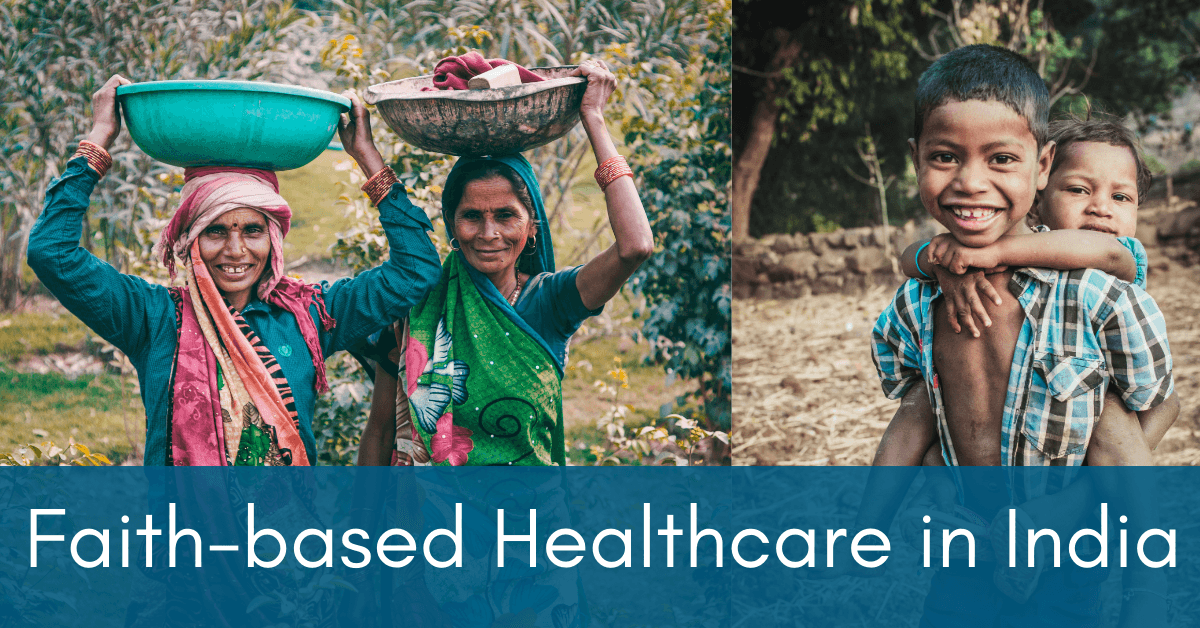
Country Spotlight Series, Health Systems Strengthening
Faith-based Healthcare in India
Role of Faith-based Health Providers
Faith is a fundamental part of life for people across the globe. Research shows that worldwide, more than eight in ten people identify with a religion. According to the Pew Research Center, in many emerging economies, including India, 80 to 90% of people say religion is a very important part of their daily lives.
With India’s public health expenditure around 1.15% of its Gross Domestic Product, there is an insufficient supply of publicly funded healthcare facilities and health professionals. Alongside the public sector, the private sector is responsible for over 70% of outpatient care and 60% of inpatient care. It is also estimated that 21% of individuals in India fall below the poverty line. Faith-based organizations are integral to meeting the needs of individuals who cannot access public healthcare due to poverty and lack of access in rural settings.
With India’s public health expenditure around 1.15% of its Gross Domestic Product, there is insufficient supply of publicly funded healthcare.
INDIA COUNTRY PROFILE
- India Population (2019) : 1,366,417,750
- Life expectancy: 68 (male)/70 (female) (2018)
Maternal Mortality Rate:
Under 5 Child Survival Rate:
- Under 5 Mortality is 34 per 1000 live births (2019)
- Infant mortality rate (between birth and 1 year, per 1,000 live births) is 28 (2019)
- Ranked 45th among countries
Antenatal Care and Skilled Attendance at Birth:
In 2016, 81% of births had a skilled attendant present
Child stunting and Nutrition:
35% of children younger than five years of age are stunted (2016-2018)
Gross Domestic Product:
Religious Landscape: (2010 data)
- 80% of population is Hindu
- 14.4% of population is Muslim
- 2.5% of population is Christian
What is a Faith-based Health System?
Faith-based health care providers include everything from small clinics supported by individual churches to complex networks of hospitals and medical and nursing training colleges. Many countries, including India, have organized networks of Christian healthcare institutions.
The three largest Christian health networks in India are: the Christian Medical Association of India (CMAI) with 330 Protestant institutions, the Catholic Health Association of India (CHAI) with over 3,500 institutions, and Emmanuel Hospital Association (EHA), a Protestant Evangelical organization with 20 hospitals and a large network of community health projects.
All three associations express commitment to work toward health for all, especially for “resource-poor people of India living in remote and difficult-to-reach areas of the country, who have little to no access to healthcare in the places where they live.”
The three major Christian health networks in India express commitment to work toward health for all, especially for “resource-poor people of India living in remote and difficult-to-reach areas of the country, who have little to no access to healthcare in the places where they live.”
Example 1: Christian Medical Association of India
The Christian Medical Association of India (CMAI) is a membership association of mission hospitals and healthcare institutions across India, as well as health professionals (including doctors, nurses, administrators, and chaplains) and allied health professionals. CMAI’s mission is to serve the church in India in its ministry of healing and to build a just and healthy society.
CMAI partners with other faith-based organizations and networks such as the National Council of Churches in India (NCCI); Emmanuel Hospital Association (EHA); The Centre for Bioethics (TCB); the Evangelical Medical Fellowship of India (EMFI), which nurtures the medical fraternity who run CMAI member hospitals; The Leprosy Mission Trust India, which has 14 hospitals; and the Christian Coalition for Health (CCH), which promotes advocacy with the Indian government. (P. John, personal communication, August 10, 2020).
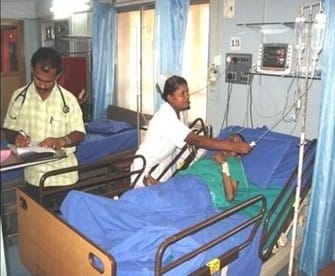
CMAI IN REVIEW
CMAI has the following members and programs:
- 270 member institutions, including hospitals
- 4 medical colleges
- 9,000 health professionals
- 34 GNM (Nursing) Schools
- 12 ANM (Nursing) Schools
- 57 Training Centers under the Central Education Board of CMAI.
CMAI member institutions provide free or affordable treatment to individuals belonging to economically weaker sections of the society in the following areas:
- maternal and reproductive health
- cancer
- tuberculosis
- malaria
- HIV/AIDS
- heart disorders
- cataract and cleft lip surgeries
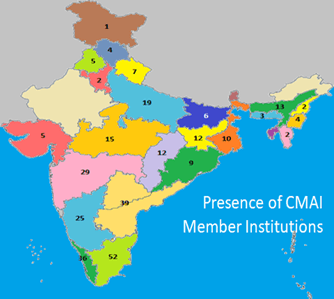
As a valued partner in the national health system, CMAI provides training to government hospitals. CMAI also fills gaps in health care coverage where the government may not have specialty doctors or a structure of secondary services. For example, amidst the COVID-19 global pandemic, CMAI has been working in close partnership with the government to designate mission hospitals for triage services, admission, and testing. (CMAI General Secretary Dr. Priya John, personal communication, August 10, 2020)
Example 2: Emmanuel Hospital Association
Emmanuel Hospital Association (EHA) has a reputation of trust and holistic care in the communities where its hospitals and programs are based. EHA does not turn patients away for lack of finances and has provisions to write off bills either partially or fully based on the economic condition of the patient (S. Mathew, personal communication, July 25, 2020).
Community programs complement the work of EHA hospitals and reach approximately 2 million people through community health and development programs each year. EHA outpatient departments serve approximately 900,000 patients annually, and inpatient departments serve approximately 90,000 annually.
During times of crisis, EHA has continued to provide care to patients and adapt to COVID-19 when other hospitals could not. For example, during the COVID-19 global pandemic, EHA has been able to help hospitals obtain much-needed PPE. EHA has also led bold and innovative approaches in response to disasters, community-based rehabilitation, palliative care, mental health issues, and more. (Dr. Saira Mathew, Executive Director, EHA, personal communication, July 25, 2020).
Above figure shows EHA locations of hospitals, community health and development projects, research locations, nursing schools, Prison HIV intervention and Partnership projects, and Emergency Relief and Mitigation Projects.
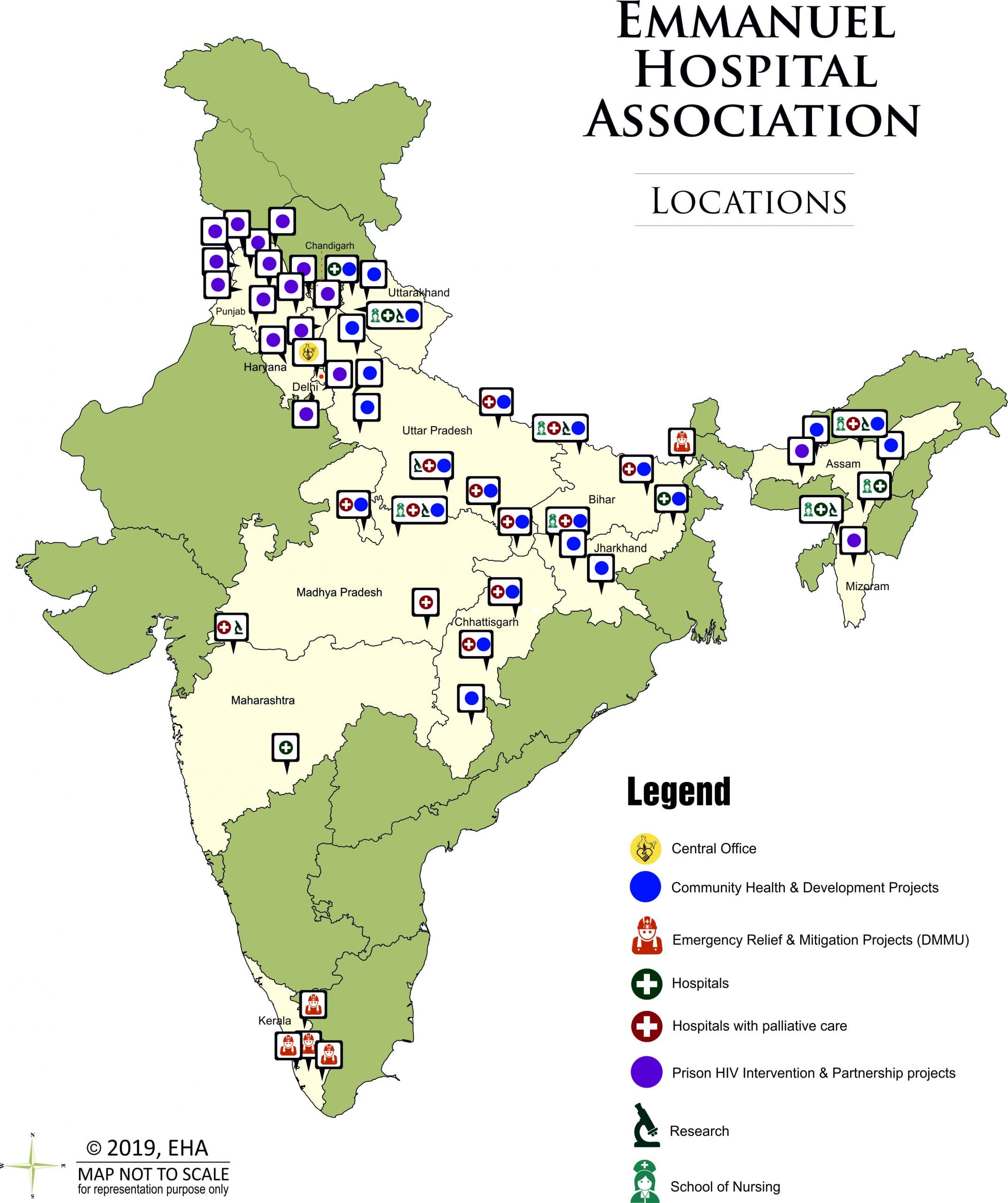
During times of crisis, Emmanuel Hospital Association has provided care to patients when other hospitals could not. For example, during the COVID-19 global pandemic, EHA has been able to help hospitals obtain much-needed PPE.
Example 3: Comprehensive Rural Health Project, Jamkhed, India
Comprehensive Rural Health Project (CRHP) has served in the Indian state of Maharashtra since its founding in 1970 by Dr. Raj and Dr. Mabelle Arole, Christian doctors motivated by their faith to serve the marginalized and the poorest of the poor. CRHP was one of the first organizations in the world that used illiterate women as village health workers (VHW) (Connie Gates, personal communication, July 13, 2020).
VHW’s are appointed by their community as respected leaders and are responsible to their community to be informed on various health topics through their training with CRHP. They also organize community groups through an empowerment process to work together and address problems in the community. Each VHW serves approximately 1,000 individuals, and CRHP serves roughly 500,000 people each year.
Through CRHP’s pioneering and community-based approach, it has strengthened the health, sustainment, and community involvement in many villages in India. CRHP provides services that address health problems to supplement government programs, like non-communicable diseases and mental health services.
Not only has CRHP been recognized by the World Health Organization (WHO) and UNICEF for their remarkable work, but thousands of individuals from other FBO’s, NGO’s, and governments around the world have traveled to Jamkhed for training to adopt the Jamkhed Model of community-based primary healthcare.
This model is a holistic approach to address poverty, social determinants of health and inequity, stigma, disease, as well as empower marginalized communities through education, leadership opportunities, and job satisfaction.
CHRP-trained workers aim to be role models of Christ-like love and service in their communities. (Connie Gates of Jamkhed North America, personal communication, July 13, 2020).
Example 4: Catholic Health Association of India
The Catholic church oversees a large network of health care facilities across India, serving more than 21 million patients in India annually and overseeing self-help groups with 2 million members. The Catholic Health Association of India (CHAI) supports its member institutions across India in the areas of community health, caring for people with disabilities, palliative care, and caring for children with HIV. Health care is unaffordable for a majority of India’s population. CHAI’s over 50,000 religious volunteers help the organization serve the underserved. Over 80% of CHAI’s work in India is in remote, medically unserved regions.
Recently, the Catholic Health Association of India outlined its 2030 vision to sustain and improve their capacity to serve the people of India with compassionate, quality, affordable healthcare, particularly for the poor and marginalized.
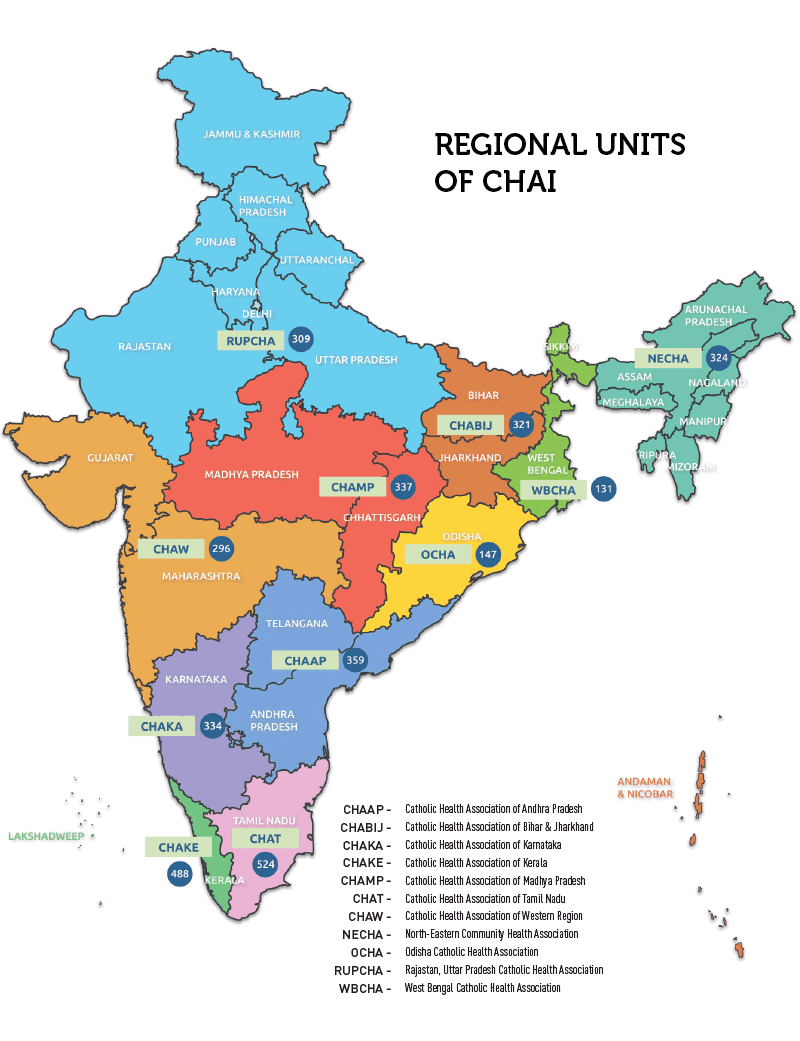
Catholic Health Facilities & Services At-A-Glance
- 70,000 inpatient beds (23% in rural areas)
- 3,500 Clinical Establishments from primary care to tertiary hospitals
- 21 million patients
- 76,000 medical professionals
- 3,500 member institutions
- 1,000 sister doctors
- 5 medical colleges
Christian Medical Colleges
While there are many Christian medical colleges belonging to different churches, three are well-known and highly ranked by national organizations and publications: Christian Medical College, Vellore; Christian Medical College, Ludhiana; and St. John’s Medical College in Bangalore.
Health Care and Other Faiths in India
Christian mission hospitals represent one of the largest providers of healthcare in India after the government. However, India’s religious landscape is vast, with 80% of the population identifying as Hindu, 13% as Muslim, and 2-3% as Christian. Hindu and Islamic organizations also provide a significant amount of health care in India.
Large Hindu hospitals include the Ramakrishna Mission, Bochasanwasi Shri Akshar Purushottam Swaminarayan Sanstha, The Isha Foundation, Sathya Sai Baba Hospitals and Institutes of Medical Sciences, and more. (K. Long, Personal Communication, July 25, 2020). Large Islamic hospitals include the Prince Aly Khan Hospital in Mumbai, Era’s Lucknow Medical College and Hospital, and Shadan Hospital in Hyderabad. Global networks like Islamic Relief are also active in India, particularly during emergencies
Conclusion
Faith-based organizations in India are vital to providing access to health care for those living in poverty or regions without access to care. Christian hospitals and health networks work to fill the gaps not covered by public healthcare and act to support the public healthcare systems, as they did by designating mission hospitals to treat and test for COVID-19.
Without the work of FBOs in India, patients living in poverty would have limited access to specialty services and care in areas such as maternal and reproductive health, tuberculosis, malaria, and HIV/AIDS. FBOs in India serve as a model for the use of village health workers, pioneered by the Comprehensive Rural Health Project. Christian mission hospitals represent one of the largest providers of healthcare in India and are vital not only to the delivery of care, but also to community health education and prevention of disease.
The CCIH Country Spotlight Series features Christian health services, including those provided through facilities, communities and churches. The aim of these pieces is to help identify influential Christian health organizations and highlight key partnerships and initiatives that improve health for those in need. These pieces are illustrative and will not represent or reflect the entirety of important Christian contributions to the design and delivery of health services. CCIH is a non profit association based in the United States with members across the globe.
CCIH Intern Marie Jankowski, MPH conducted research and writing for this report.
